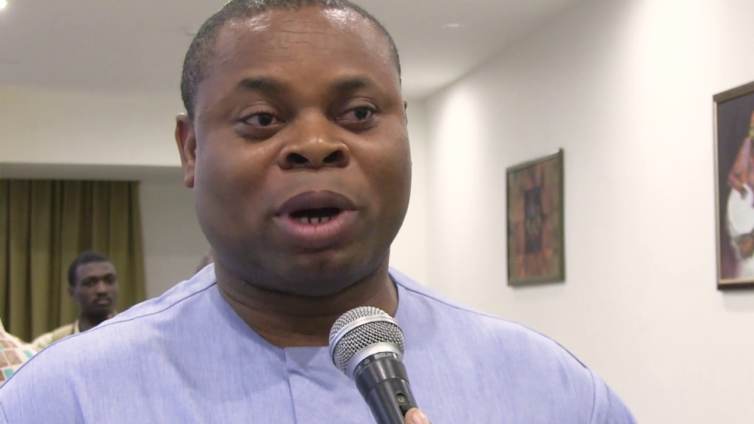
Audio By Carbonatix
IMANI Africa’s Franklin Cudjoe has called for a radical shift in Ghana’s governance approach, warning that traditional bureaucratic controls have failed and are, in fact, part of the problem.
Speaking at the National Economic Dialogue in Accra, he questioned whether Ghana’s public financial management system has become more about maintaining power than serving the public good.
“For decades, we have built layer upon layer of controls and restraints, thinking that this will prevent the abuse of the public purse,” he said.
“Yet, the more we add, the more convoluted and opaque the system becomes. What we now have is a governance albatross.”
Mr Cudjoe argued that Ghana’s political and bureaucratic elite have mastered the art of using public sector complexities to shield corruption and inefficiency.
“We have so many institutions meant to check corruption and mismanagement—yet nothing is clear. Everything has become murky,” he stated.
“We keep applying the same failed logic, expecting different results.”
Read also: The governance albatross in public financial management: Time to consider the stewardship model?
Instead of simply tightening bureaucratic controls, he proposed a stewardship model that incentivizes ethical leadership and transparency.
“We need to amplify the behavior of public officials who have a strong vision for Ghana’s prosperity,” he said.
“We must move away from transactionally coercing accountability and focus on building a culture where public officials take genuine pride in their work.”
Franklin Cudjoe outlined IMANI’s proposed RESET framework - Revitalising the Economy through Stewardship & Ethical Transformation - which aims to promote openness and accountability.
“Ministers and Chief Directors should voluntarily sign onto a framework of openness and stakeholder co-creation of their sector’s vision,” he suggested.
“They should commit to open data, radical transparency, and regular public engagement.”
His model includes bi-weekly town halls where procurement details, project performance, and policy decisions are openly discussed.
“Citizens should be able to tune in, ask questions, and join the stakeholder group monitoring these leaders,” he said.
“At the six-month mark, we celebrate progress and provide feedback for improvement.”
Mr Cudjoe believes this approach would complement, rather than replace, existing financial oversight mechanisms.
“Naturally, RESET will not substitute formal audits and public financial controls,” he clarified. “But it will invigorate them—bring their essence to the fore and make them more meaningful to citizens.”
As part of broader reforms, he called for bold policy changes, including:
• A strict rule that ministerial vehicles be procured only once every ten years, with no luxury purchases.
• Direct taxation to fully fund key programs like NHIS, GETFund, and Free SHS, preventing misallocation of funds.
• Reforming the appointment process of the Auditor-General to ensure impartiality, with opposition parties selecting the candidate.
• Strengthening the Office of the Special Prosecutor (OSP) to handle all criminal prosecutions, while a separate Solicitor General manages civil cases.
He warned that Ghana’s governance culture is dangerously close to institutionalized failure.
“When bureaucratic systems become tools for aligning the narrow interests of public officials with the parochial interests of certain voter blocs, the national interest is lost,” he said.
“We have seen it happen—politicians and their cronies lobby for public resources in ways that undermine the country.”
Franklin Cudjoe challenged Ghanaians to rethink their expectations of governance and demand more from leaders.
“If we continue to operate on the same broken logic, we will keep getting the same broken results,” he said. “The question is, are we ready for real change, or are we just playing with hellfire?”
Latest Stories
-
Pope Leo to tour four African countries in first major overseas trip of 2026
3 hours -
Ghana’s cocoa buyers owe banks up to $750m, raising fresh liquidity risks
3 hours -
Ghana reaffirms commitment multilingual education at International Mother Language Day event in UK Parliament
4 hours -
Nvidia forecasts first-quarter sales above estimates
4 hours -
FDA orders removal of mixed drinks containing both alcohol and stimulants from market by March
4 hours -
Nothing new; you just renamed Bawumia’s G4R policy GANRAP – Gideon Boako to Finance Minister
4 hours -
John Jinapor commissions MBH Power Ghana Ltd.’s energy meter manufacturing unit
4 hours -
Ukraine refutes claims linking it to Burkina Faso attack
5 hours -
A quiet ride through Kumasi: How a climate journalist is rethinking urban transport
5 hours -
NSA releases postings for 6,867 nurses and midwives
5 hours -
Africa’s $250bn climate finance gap: Ghana hosts summit to shift ESG from reports to real investment
5 hours -
ECG outlines key factors driving higher electricity consumption
5 hours -
Accra’s power demand can consume Akosombo output – ECG
5 hours -
Award-winning photographer, Tolani Alli encourages creatives to build lasting impact
5 hours -
5G by 2027: Gov’t directive puts telecom regulator on the clock
6 hours

